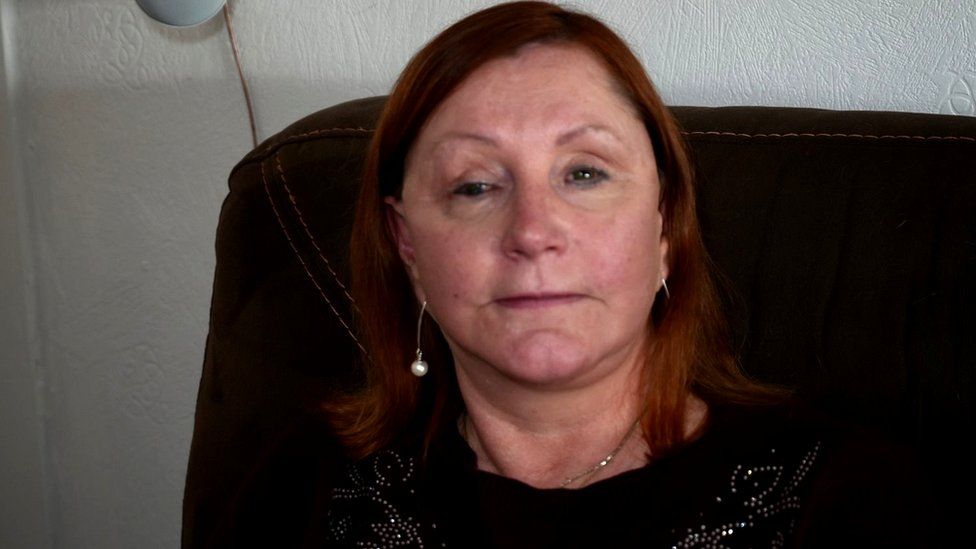4 hours ago
About sharing
As a counsellor, Claire Jennings has always been there for other people. But she is one of hundreds of disabled people caught up in a contractual dispute between a county council and a firm that provides payroll services. And they all have the same question: “Where has our money gone?”
Claire Jennings is registered blind and has scoliosis, a spinal condition that causes her “constant pain”.
In April, she lost all hearing in her right ear, which has affected her balance.
She is entitled to 29 hours of support every week, which includes help to get up, wash, dress and take medication, as well as preparing meals to make sure she does not eat food that could be out of date.
“In the most recent budget we were told that disabled people should work,” she says.
“I do work, but I can’t sit in front of my clients if I’m still in my pyjamas.”
She says it is these little things that others might “take for granted” – but give Claire “dignity, and offer meaning to my life”.
Claire is one of about 1,500 disabled people in Essex who use “direct payments” to buy personal care, and whose budgets are held by an organisation that manages payroll services, like paying carers and sorting out tax or National Insurance.
The payroll firm Purple, based in Chelmsford – and its predecessor Essex Paths – provided this service for nearly two decades, but the contract was terminated by Essex County Council in July, and a new firm, Penderels Trust, was appointed.
Claire says that, at that time, she had almost £2,000 in her account because she had been advised by Purple to keep a “buffer” for emergencies.
But since July, she has contacted both Purple and Essex County Council a number of times to find out where her money is and why it has not been paid to her, or transferred to the new provider.
She says she was told her outstanding balance would be returned in August.
Five months on, she has still not received a penny. The situation has left Claire extremely worried.
“There’s no transparency, no communication about where it’s gone,” she says.
She feels it is “unfair” that disabled people are caught in the middle of the dispute, likening the situation to a child of divorcing parents.
“We are collateral damage to something I’ve got no comprehension of,” she says.
The BBC has spoken to a number of Purple service users who set up a Facebook group called “Unhappy Carers and Customers”.
Their complaints include late payments to carers, incorrect payments to HMRC, poor communication, and a failure to provide up-to-date account statements.
Among them is Mary Hunt, who looks after the personal budget of her daughter Laura.
Laura is 41 and has Down’s syndrome, asthma and an underactive thyroid. She also struggles to regulate her body temperature.
She lives in supported accommodation with 24-hour support staff in Chelmsford, and is also entitled to 25 hours of personal care every week.
‘Huge consequences’
Mary says she had no problems with Purple up until 2017 when she says the service “deteriorated”. Since then, she says life has been “chaotic” and “stressful”.
On one occasion last year, Laura’s account had gone into debit and Mary said she called “90 times in a week” to get hold of someone who could sort out the issue.
Like others, she has had problems with carers and personal assistants being paid on time. One carer, to whom Laura had become attached, left the sector altogether because payments were so unreliable, she said.
“To this day I have no idea how much was left in that Purple account,” she says.
She says she tried to contact the new provider, Penderels Trust, but found that they were “inundated” with others in the same situation.
By the end of July, Mary took the decision to take control of the budget herself.
She says she holds Essex County Council responsible for failing to take action when she and others had made complaints about Purple for some years.
“These pots of money keep families going, keep people safe, keep them secure,” she adds.
“When you mess about with people’s lives like this, the consequences are huge.”
Purple told the BBC: “Our aim is to provide a high quality, individualised service. Every person deserves the support and tools to meet their day-to-day needs.
“We are sorry to hear about the concerns raised by Claire and Mary. Their experience does not reflect what we strive to achieve.
“Unfortunately, we are unable to comment publicly on the detailed points raised as we take confidentiality seriously.”
A spokesperson for Essex County Council said the authority was “in the process of reconciling all funds that were held by the previous Direct Payment Support Service provider”.
“This is taking some time due to the volume of information and accounts that need to be reconciled,” the spokesperson added.
“However, all funds will be transferred with no detriment to any individual who receives a direct payment. All care commitments will continue to be met.”
Follow East of England news on Facebook, Instagram and X. Got a story? Email eastinvestigationsteam@bbc.co.uk or WhatsApp 0800 169 1830
Related Topics
5 December
18 September
20 June
18 May 2021
